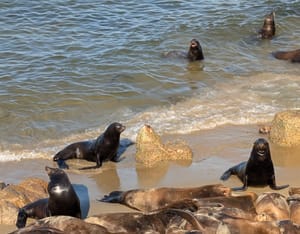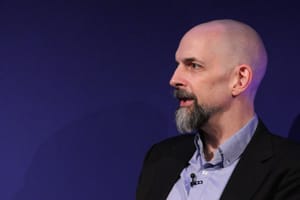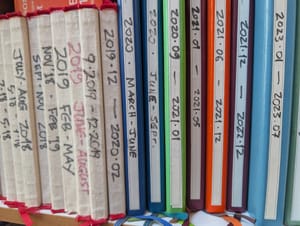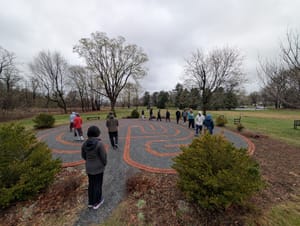Last weekend, on a sunny balcony overlooking Monterey Bay, with cocktail chatter in the near background and sea lions barking in the distance, I talked about love with a 20-year veteran of the U.S. Army Special Forces.
My new friend spent 10 tours of duty first as a grunt, then as a Green Beret sniper and medic. His story is not mine to tell, so I won't repeat it here. But what struck me – and shocked me even – was how forthrightly he recognized love as the animating energy underlying all existence.
This was a remarkable thing to hear from a man with his career, and a guy who looks every bit as tough as you'd expect of someone who's been wounded multiple times across decades of action. He joked that he looks like a GTA character or a Disney villain, and he's not far off.
But love is what motivates him. And while he didn't recognize it until later in life, love motivated his military career, too.
Needless to say, my own background and career couldn't be more different from his. (Though we did discover a shared love of Dungeons and Dragons, which we both played as teenagers.) As a result, my point of view on love is different, too. I don't agree with him on many things.
But he also has a sharp recognition of the interdependent nature of humanity. He couldn't do what he did without the support of everyone back home, both those in support of whatever war he was helping to fight and those against it. I recognize that as a nonviolent person in the modern world, I benefit from being defended by people like him. Yet what I do is also embedded in his existence somehow. We are all in this together.
Talking with someone very different from me, and listening deeply to them, is exactly why I came to Monterey.
That's because I believe our cracked and fractious world won't get any better until we learn how to listen better – especially to those who are different and maybe even shocking to us.
Am I worthy?
In 2015, I received an impressive-looking invitation on thick, cream-colored paper. It came from Renaissance Weekend, a nonprofit organization founded in 1981 to organize thoughtful conferences intended to "build bridges among innovative leaders from diverse fields ... by discussing the urgent questions of today and essential issues of human experience."
One of the weekend's founders, Phil Lader, was the U.S. ambassador to the U.K. during the Clinton administration. Movers and shakers show up at the conference regularly, and many are featured on the organization's website. Over 40 years, Renaissance Weekend has managed to remain vital and relevant to a steady stream of interesting and powerful people.
Had I received this magic ticket by mistake? I had not. I managed to log on to the website using the invitation code and found that I was indeed being asked to attend an upcoming weekend, either in the conference's hometown of Charleston, SC, or one of a variety of other cities and weekends to which the event has expanded.
However, it's one thing to be invited to the inner circle and another thing to find the time, means, and nerve to attend. Was I even worthy?
It was ten years before I finally attended one, last weekend.
Renaissance Weekend Monterey was a gathering of about 250 remarkable individuals for conversation, panel discussions, presentations, and good food. The easiest way to describe it is that it's a big-ideas festival featuring a lot of impressively accomplished and smart people.
Everything is off the record (Chatham House rules), no one is even allowed to photograph speakers or panelists onstage, pitching your business is frowned on, and political debates – at least in a traditional partisan sense – are not encouraged. Everything else is on the table, it seems, from tech and business to the future of democracy. And, of course, the nature of love.
What did I learn?
Everyone whom I've told about this weekend has asked me: What did you learn? I learned that the experts who are building and researching AI models remain incredibly optimistic about the technology's continued exponential growth. They don't see an AI plateau, or if there is one, it's due to temporary shortages of chips and electricity.
I learned that these same experts are certain AI will make enormous changes in society, and that it's urgent for us to make wise decisions about it, soon. AI can help us solve the climate crisis and provide limitless energy and opportunity for everyone. Or it can lead us into war and the destruction of civilization. Which way it goes depends on what AI experts and policymakers do today and over the next few years.
Maybe those of us who write about technology can play a role here. By talking about love, we can remind others of what really matters. By centering humans in our writing, we can help ensure that AI supports connection and human thriving.
To that end, many of the AI experts seem sure that some form of universal basic income is inevitable, and that the sooner we implement it, the better things will be for everyone. It would certainly forestall a lot of the anxiety about job loss that seems pervasive in AI conversations these days.
I heard people's perspectives on creativity, effective thinking, astronomy, space exploration, mycology, politics, religion, and economics.
I learned that elders are in demand: Gen Z people are craving connections to older folks, as a balance to their always-online, always-connected, social media-centric lifestyles.
I learned that software needs beauty: A well-designed and beautiful interface can differentiate a product and make people truly love it.
I learned that there are people willing not only to fundraise for Ukraine, but to lead convoys of supplies into the country to support the people and the army. I heard that living in Kyiv today is safer than living in New York City. It's far from the front and hasn't been much targeted since the start of the war. Meanwhile, deaths from traffic and violent crime are lower in Kyiv than they are in the Big Apple.
I'm not convinced enough to visit myself just yet, though.
I learned that even while religion is declining among white Americans, it is strong and growing among immigrant populations. In Boston, a town that has not been friendly to traditional religion for over a century, the number of churches has doubled in the past few decades, driven mostly by immigrant-centric, non-English-speaking churches.
And I learned that I am capable of co-leading a mindfulness session, with someone I just met, that provides a calming and grounding, centering experience for a group of people I also just met. We did this three days in a row, every afternoon.
It was just what I needed after all that intellectual and emotional stimulation.
What it's like to attend a Renaissance Weekend
But really, it's not so much about what I learned as who I met, and how the discussions stimulated thought and curiosity. I came away with several new friends I'm looking forward to staying in touch with.
One of the features of Renaissance Weekend is that every participant is also a speaker. Through a packed schedule of panels, nearly everyone gets a chance to share their thoughts on one or more of their areas of expertise. (I was on three panels plus a plenary session at the end, in addition to the mindfulness.) And since there are often six or seven panels happening simultaneously, it's hard to decide what to attend. This means it's also a great opportunity to practice public speaking. You'll definitely be speaking, but with so many panels happening at once, the audience for most panels is comfortingly small. And I found the moderators to be skillful and generous.
I often felt intimidated by the sheer level of accomplishment among attendees. When I was sitting on a panel next to people who are running major organizations and have had brilliant careers in media, business, arts, and politics, it was easy to start comparing my resume with theirs. When I learned that many of them also have impressive extracurricular accomplishments in sports, martial arts, and music, imposter syndrome reared its head again. I know I'm not alone in feeling this, because I heard from other attendees about how awed they were by the crowd.
That said, the overall tone of the weekend was welcoming, friendly, and curious. Almost everyone was genuinely interested in what I did for work, what brought me there, and what I thought about the event. And many of the conversations I had got very deep, very fast, like the one with my new friend from the Special Forces. Several times, I met people over breakfast or in the lunch line and found that, within minutes, we were talking deeply about family, love, race, hope, and joy. Many of those people have wildly different views than I do about things, but we were still able to connect and listen to one another with curiosity and interest.
Renaissance Weekend is a surprisingly family-oriented event. Many couples attended together, and there were quite a few families who brought their children. There was a camp for the kids full of activities to engage them (learning about space from actual astronauts, learning about whale songs from someone who is working to decode whale language), and the teens also occasionally attended the grown-up panels. Bringing families into the mix is a nice touch: It takes the "professional" edge off and helps everyone see each other as more fully rounded human beings.
There's a wide range of ages and professions represented. Racial diversity is not great (white people are overrepresented), though it seems the organizers are making efforts to be inclusive, and no one shied away from the topic of race. Economically, nearly everyone is on the upper end of the scale.
What was missing: There was concern for the future of democracy, but very few people speaking directly about the way it's being undermined and limited, in the U.S. and abroad, or what we might do about that.
While there was much discussion about Ukraine, there was almost no mention of the relentless assault on the civilian population of Gaza and the total destruction of its cultural and social infrastructure.
And I didn't hear anyone talk about class and wealth inequality and the responsibilities of people with privilege (like those of us in the room) to help others; most of the words of encouragement and hope for humanity were pretty generic.
If these were my final words
I've written a lot here because I found very few public accounts of Renaissance Weekend experiences, so I'm hoping this post will be useful in encouraging others to attend. If you get an invitation, go!
On the very last day, Labor Day, there was just one plenary session after breakfast. I was on the panel that morning. About 30 of us were tasked with sharing our "final remarks" on the weekend, if not on life, in just two minutes each.
Since I've been practicing listening deeply and turning what people say into poems, I wrote a poem for the weekend. It quotes liberally from things I heard during the weekend, but per Chatham House, neither the identity nor the affiliation of the speakers is revealed, so I can share the poem here.
Enjoy.
TELL ME MORE
what does it mean to meet on the edge
of an underwater forest
whose frondy fringes are all we see
of vast and teeming deeps
sea lions porpoising through the waves
and piling themselves on the beach
barking and posturing, bumping chests
then flopping down to sleep
to feel beneath our feet the force
of gatherings past and present
those who lived here, loved,
and left, or were forced to leave
to be cared for so attentively
by those who planned the program
and those who carry back
our dishes to the kitchen
I've been often on the verge
of tears, overstimulated
and elated by the energies
of so much accomplishment
thoughts swirling like a school of sardines
in the brilliant blue-green bay
then dispersing, leaving
nothing but my breath
let us consider together
how it is through history
what we invent makes mirrors
showing us to ourselves
can democracy survive?
perhaps we need more fear
and outrage, maybe fungi
are going to save the world
the truth is paywalled but lies are free;
memories, the fabric of who we are
yet there is a space between
the stimulus and response
may we come to understand
we're on an island, a blue
marble in a universe
of glittering lights
may we glimpse the overview
given to those who orbit above
may we learn to use our agency
we will think on these things
how we listen is how we learn
and how we give attention
to those we know and those we meet
is my working definition
tell me more
tell
me more tell me
more



